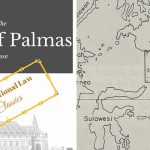I am going to sneek this case into the series while I still legitmately can. The Nottebohm Case was a staple of international law teaching for a long time, but is now on the wane. And the reason why that is, of course, globalization. The relevant question that this case evokes is to what extent an individual is and should be tied to a state by nationality, and enjoy a state’s protection. But let’s start with the plight of Friedrich Nottebohm.
The ’plight’ of Friedrich Nottebohm
Friedrich Nottebohm was a German citizen, who had been living and doing business in Guatemala for 34 years on the eve of World War II. Barely a month after the start of said war, he applied for citizenship of the country of Liechtenstein, although he had little or no ties to it. His motives were obvious: Being a citizen of a neutral country would be better than that of a belligerent country. According to the rendition of the facts in the case, it seems that Nottebohn and/or Liechtenstein had taken some shortcuts in the legal process towards naturalization. And despite being admitted back into Guatemala and registering as resident alien from Liechtenstein, his new status did not work as intended. In 1943, Guatemala arrested, detained and expelled Nottebohm from the country as it joined the Allied camp and declared war on Germany. He was refused re-entry into Guatemala and his property was seized without compensation. Of course, he protested.
The admissibility of a diplomatic protection claim
The last resort for Nottebohm to get back to Guatemala, reclaim his property and get compensated was the help of Liechtenstein through diplomatic protection. That term is a bit misleading, because it is not the protection of diplomats. When the treatment of a foreign national entails the violation of international law, the state of which that foreigner is a citizen may hold the offending state responsible. It is the protection of a citizen, through diplomatic means, including the use of an international court. Such was the case with Liechtenstein. However, in order for its claim of diplomatic protection to be admissible at the International Court of Justice, the individual must satisfy two criteria. First, to have indeed the nationality of the state exercising its right of diplomatic protection; and two, the person in question must have exhausted all remedies available in the offending state. Now, Guatemala casted doubt on the admissibility of Liechtenstein’s claim. Did Nottebohm really have the Liechtenstein nationality?
Genuine nationality
The Court had to acknowledge that it is within the prerogative of every state to determine its own nationality laws, i.e. under what circumstances it naturalizes persons. However, according to the court, that doesn’t mean that the naturalization has automatic effect in international relations. The Court did not accept Liechtenstein’s argument that in the process of Nottebohm’s re-entry into Guatemala his new nationality was implicitly recognized. But under what circumstances should Guatemala recognize Nottebohm’s new nationality as a matter of obligation under international law? With reference to the decisions of national courts and national arbitrators on issues of dual nationality, the Court argued that there must exist ’real and effective nationality’. ’Nationality must correspond to the factual situation.’ International law textbooks often have used the term ’genuine link’ as the concept to be taken from this case. And given Nottebohm’s ’extremely tenuous’ connection with Liechtenstein, the Court concluded that there was no genuine link between Nottebohm and Liechtenstein. The submitted case was, therefore, inadmissible.
Global citizens?
But is this criteria still tenable, compatible with our modern and globalized sensibilities? The Court surmised that ’nationality is a legal bond having as its basis a social fact of attachment, a genuine connection of existence, interests and sentiments (…).’ Can that still be argued today? Aren’t we much more global citizens with far less attachment to our mother- or fatherland? Nationality laws will still make demands that ensure a certain amount of connection with the newly adopted country. But as people travel, work and generally live more internationally, the social attachment is becoming less and less. The International Law Commission argued in 2002 that the Nottebohm-criteria should not be used anymore because millions of persons would otherwise be excluded from diplomatic protection (p. 176, para. 6). So the ILC is advocating a formal approach to nationality. Which makes sense I guess, although it seems rather paradoxical. Stick to a formalistic attachment to a state, because individuals are less and less formally attached to any state…
Are you very much attached to your nationality? Or would you have no qualms about assuming another? Let me know in the comments below, Facebook or Twitter. Or find me on Snapchat if you dare.



